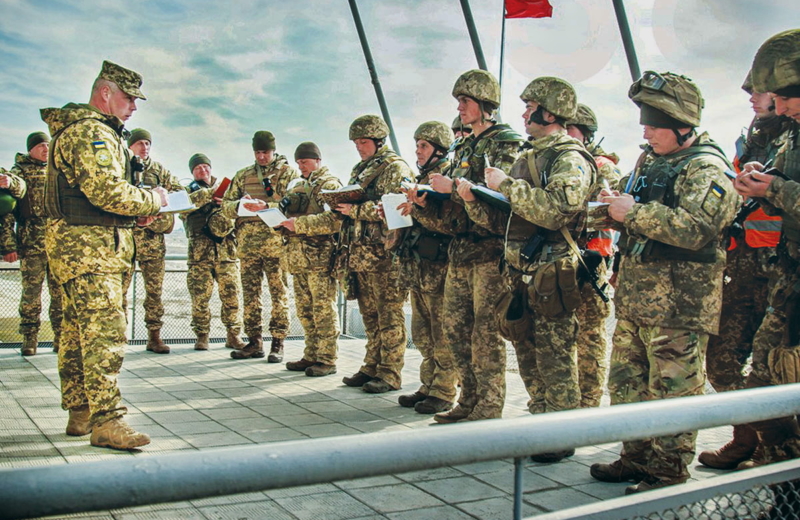Parliament waded into some controversial legislation on Jan. 16, its first day back in session since the Christmas break, debating at second reading the bill on reintegrating the Russian-occupied part of the Donbas with the rest of Ukraine.
But a final vote on the bill was still far off as the session closed at 6 p.m., and lawmakers had only considered 482 our of 675 amendments to the bill proposed while it was in committee.
Law No. 7163, submitted to the Rada by President Petro Poroshenko, was registered on Oct. 4 and quickly passed first reading just two days later. It then went for consideration in committee.
If adopted, the law will clarify the legal status of the Russian-occupied parts of Donetsk and Luhansk oblasts. The law also declares Russia to be an aggressor state, and that parts of the Donbas are occupied territories administered by Russian occupation authorities. In addition, it references legislation on the temporarily occupied territories approved back in April 2014, defining the beginning of the occupation as being Feb. 20, 2014, when Russian soldiers in unmarked uniforms first appeared in Crimea and started to seize control of the Ukrainian territory.
Parliament Speaker Andriy Parubiy had hoped to have the bill adopted on Jan. 16, but as evening wore on the amendments to the bill were still under consideration.
The full name of the bill is “The Law on the Peculiarities of State Policy to Ensure the State Sovereignty of Ukraine Over Temporarily Occupied Territories in Donetsk and Luhansk Oblasts.”
The draft bill is also designed to create the legal basis for the presence of Ukraine’s armed forces in the war-torn region without declaring martial law. If it is approved, the Security Service of Ukraine would cease being formally in charge of all military operations there. Instead, all troops and law enforcement formations in the region would be subordinated to the Joint Operation Headquarters, the head of which would be nominated by the Chief of the General Staff and approved by the president.
The Anti-Terrorist Operation, as the war has been referred to up until now, will become “the implementation of measures to ensure national security and defense, and to deter and suppress Russian armed aggression in Donetsk and Luhansk oblasts.”
Once the bill is approved, the president will have to cancel his order on the anti-terrorist operation, according to Oleksandra Dvoretska, a lawyer and the coordinator of the Vostok SOS (East SOS) NGO.
However, the new bill doesn’t define exactly which parts of Donetsk and Luhansk oblasts are under Russian occupation. It also defines a so-called “safe zone,” an area adjacent to the occupied territories, though without mentioning the exact size of that territory. In both cases, they will be defined later by the president.
During the debate, lawmakers asked why the law does not also directly declare Crimea to be a territory under occupation by Russia.
“Are we planning to renew the sovereignty of our territory only in Donetsk and Luhansk Oblasts, or will we, as a state, build our state policy on sovereignty over all of our territories, including Crimea, to the last?” Olena Sotnyk, a lawmaker from the 26-member opposition Samopomich Party faction, said in the Rada.
Dvoretska from Vostok SOS said Crimea is not mentioned because the law is designed to cover only territories where there is an ongoing armed conflict. Moreover, the parliament has already adopted the separate law on Crimea and “it’s not bad,” she said.
The reintegration bill leaves some questions, especially regarding the increase in the powers of the president and law enforcement power, according to Dvoretska.
She said that under the law, the president’s powers go beyond those allowed by the Constitution. For instance, he can order the use of the army without requiring confirmation from parliament.
Instead of changing several laws, the president has expanded his powers within one law, Dvoretska said.
“This sets a bad precedent – it means that it is possible to overwrite powers specified by the constitution with a regular law, with just 226 votes,” Dvoretska said. Normally, to change the Constitution at least 300 lawmakers have to vote in favor.
The Samopomich parliament faction also opposes the possible resumption of trade with the occupied territories and has constantly called for an all-out blockade. Meanwhile, Ukrop (the Ukrainian Association of Patriots, a Ukrainian nationalist movement that has two seats in parliament) said it would boycott the voting since almost all of the amendments proposed by the faction had been rejected.
“First, we must cut diplomatic ties with Russia,” a statement on the party’s website reads. “As well as prohibit trade with the occupied territories and an amnesty for militants, assign Crimea and Sevastopol the status of occupied territories alongside the (occupied) districts of Donetsk and Luhansk oblasts, and create a General Headquarters and hold it accountable for repelling Russian military aggression.”
Meanwhile, around 100 activists rallied in front of the Rada, demanding that the reintegration bill and anti-corruption bills be approved. The activists set five car tires on fire, and police used tear gas after clashing with the protestors, according to Channel 5 television channel. One police officer was injured and one activist detained, media reported.



